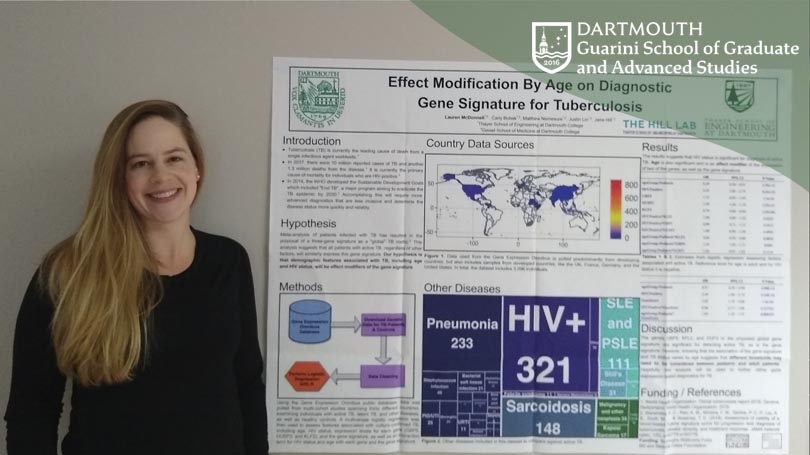
Lauren McDonnell works in the Hill Lab and is focused on developing breath-based diagnostics for detecting bacterial infections, including TB.
Tuberculosis (TB) is a bacterial infection caused by Mycobacterium tuberculosis. It is currently the leading cause of death from a single infectious agent worldwide and is the primary cause of mortality for individuals who are HIV-positive. TB is an ancient disease that has been found in human skeletal remains as far back as 9000 years ago and historically has been referred to as "consumption" due to the wasting condition experienced by patients. While it was previously more prevalent in Europe and North America, TB is responsible for the death of many famous and powerful individuals, including first lady Eleanor Roosevelt and authors Henry David Thoreau and Franz Kafka. Rates of TB in Europe and North America decreased substantially around the turn of the 20th century with economic and social developments.
Despite improvements in the Western Hemisphere, TB is still a major public health challenge throughout the rest of the world and in 1993 the World Health Organization (WHO) declared TB a global health emergency. Estimates by the WHO in 2017 suggest that as many as 1.7billion individuals, or a quarter of the world's population, have a latent TB infection, characterized by the presence of bacteria, but a lack of symptomatology due to effective immune suppression. Around 10% of latent TB cases will eventually develop into an active, contagious infection]. In 2017, there were 10million reported cases of active TB and another 1.3million deaths.
An active infection of TB is difficult to diagnose as the disease is differentially expressed across sub-populations, often affecting children and individuals who are HIV-positive differently than HIV-negative adults. Additionally, while TB often infects the lungs (Pulmonary TB), it can also infect other parts of the body (Extrapulmonary TB), further complicating detection.
The Hill Lab at Dartmouth College is focused on developing breath-based diagnostics for detecting bacterial infections, including TB. As a lab, we are interested in understanding the nuances through which TB is expressed across different populations in order to improve our diagnostic capabilities. One way to assess how subpopulations are distinctly affected is to compare gene expression differences between individuals diagnosed across critical subgroups. Meta-analysis of patients infected with TB has resulted in the proposal of a three-gene signature as a "global" TB metric. This analysis suggests that all patients with active TB, regardless of other factors, will similarly express this gene signature. Our hypothesis was that demographic features associated with could be effect modifiers of the gene signature, meaning that patients diagnosed with TB will have different gene expression, based on factors including age and HIV-status.
In order to test this hypothesis, we used the Gene Expression Omnibus public database, pulling data from studies spanning thirty different countries, examining individuals with active TB, latent TB, and other diseases, as well as healthy individuals as controls. A multivariatelogistic regression was then ;used to assess features associated with culture-confirmed TB, including age, HIV-status, expression of each gene, and the gene signature, as well as an interaction term for HIV status and age with each gene and the gene signature.
The results from our analysis suggest that age is an effect modifier of the expression of two of the genes, as well as the gene signature, implying that the magnitude at which these genes are differentially expressed in patients with active TB will be further differentiated in adults with active TB when compared to children with active TB. Knowing that the association of the gene signature and TB status varies by age suggests that different diagnostic thresholds may need to be considered between pediatric and adult patients. Hopefully this analysis will be used to further refine gene expression-based diagnostics for TB.
Funding from the Guarini Alumni Grant allowed me to travel to the Pacific Symposium on Biocomputing (PSB) in Hawaii earlier this year, where I was able to present my research, receive helpful feedback from my peers, and also learn about exciting research at other institutions. Without this generous grant I would not have been able to attend the conference. I am incredibly grateful for this opportunity – thank you!